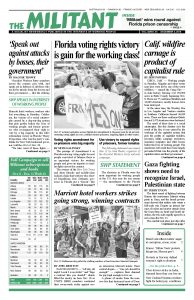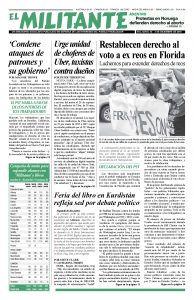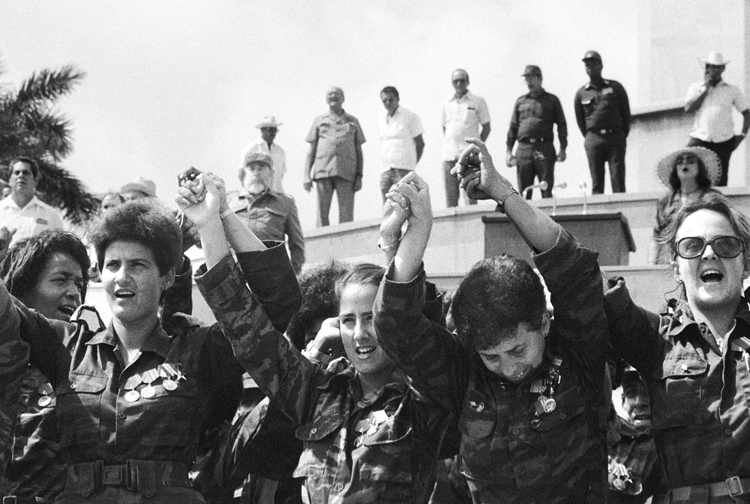Below is an excerpt from Soldier of the Cuban Revolution: From the Cane Fields of Oriente to General of the Revolutionary Armed Forces by Luis Alfonso Zayas. As a teenager Zayas joined the July 26 Revolutionary Movement led by Fidel Castro, which overthrew the U.S.-backed Fulgencio Batista dictatorship in 1959 and opened Cuba’s socialist revolution. Zayas served three tours of duty in Angola between 1975 and 1987 as hundreds of thousands of Cuban volunteers fought alongside Angolan troops to beat back the invasion of Angola by the apartheid South African regime. Zayas discusses here the big impact of this and other Cuban internationalist missions on the political consciousness of working people in Cuba. Mary-Alice Waters, a leader of the Socialist Workers Party and president of Pathfinder Press, conducted this interview. Copyright© 2011 by Pathfinder Press. Reprinted by permission.
Zayas: The big decisions to send forces to Angola were made by Fidel. The US government never imagined Cuba could send fifty thousand armed men to fight in Africa. How could Cuba do so, since we had no transatlantic merchant ships set up for troop transport, nor did Angola? But we Cubans, of course, are prepared for the greatest sacrifices, and that’s how our forces were able to be sent to Angola. All of Washington’s great strategists couldn’t even conceive of that.
How was it possible to send thousands of men aboard aged turboprop passenger planes and merchant ships? On board the freighters, they had to travel in the cargo hold. The men couldn’t go on deck or they’d be spotted. But then how do they relieve themselves? How do they bathe and wash up? How do they eat, since the ship wasn’t set up to provide meals for thousands of men? To spend three weeks like that, who can bear it? You need to have the kind of consciousness the Cubans who went had.
Their spirits were high, because they had confidence in Fidel. Fidel tried to meet with every group of soldiers that left. He’d go and talk to them. He’d explain what the situation was. And if he couldn’t go himself, he’d send someone else.
Only with a leadership like Fidel’s could something like that be achieved.
Our forces arrived in Angola in November 1975, right when they were needed. It was the same in 1987, with those needed during the siege of Cuito Cuanavale. Because in both cases, there was no force in Angola capable of taking on the advancing South African troops. Fidel made the decision to send what was needed to win, and they arrived in time to achieve that.
Fidel led everything that had to be done to defeat the South African forces. He’d spend entire nights analyzing and figuring out what had to be done and how. His direct participation was decisive. …
Waters: The experience of Angola — to have stayed with this internationalist commitment for almost sixteen years — had a broad impact on the political consciousness of the Cuban people. Fidel once said the revolutionary spirit of voluntary labor — something both he and Che had championed during the opening years of the revolution, but had sharply declined in the 1970s and early 1980s — sought refuge during that period in defense, in the mobilization of the Territorial Troop Militia, in the work of the internationalist missions. The rectification process of the late 1980s, which included the revival of voluntary work brigades to build homes, schools, child care centers, and clinics, and then the class solidarity that enabled Cuban working people to confront and surmount the political and economic challenges to the revolution in the wake of the implosion of the Soviet Union — all that would have been impossible without the internationalism, without the experience of Angola.
Zayas: We often talk about how we’ve provided help to other peoples on these missions. We go to help, to teach, to collaborate.
But Cubans have also learned a great deal. Like the way doctors in Cuba are now being trained — at the side of the patient. A doctor who trains at the patient’s side is really trained. It’s different from the training one gets in a classroom with a video. It used to be said here that doctors really start to understand what medicine is only when they finish their studies and begin to have patients. Today we take the student to the patient beginning in their first or second year. That’s a completely different kind of training. And it’s a product, in part, of what we learned from our internationalist missions.
Those serving on internationalist missions have received something else. Today’s generation didn’t live in the Cuba of old. They see photographs of what Cuba was like then, but they don’t know how life was under capitalism. It’s not that there are no problems in Cuba today. But when young Cubans go on internationalist missions, they see the reality in these places firsthand, and that gives them a clearer understanding of what the revolution changed in Cuba.
Look at what’s happening in Venezuela now. Don’t think that the Cubans serving in Venezuela today are just helping the Venezuelans. They’re also learning what life is like in a country that hasn’t had five decades of socialist revolution, with a leadership like Cuba has had, which has educated the Cuban people.
Then there’s the help we’ve given to countries facing big catastrophes — hurricanes, floods, earthquakes. Cuban doctors have gone places where people have never seen a doctor, where they may have just enough food to survive but die from lack of basic medical attention. For everyone who has gone on these missions, that kind of experience is extremely important. It creates a consciousness different from what they had before.
They go places where even news doesn’t arrive, because there are no means of communication, neither radio nor television. Simple survival is the aim. Living that reality helps mould our consciousness.
Cuban volunteers on internationalist missions in other countries are learning what Cuba used to be like. They’re living in the world where such conditions still exist. They’re learning about capitalism, about the exploitation of man by man.
So it’s not only about helping. We also receive.


